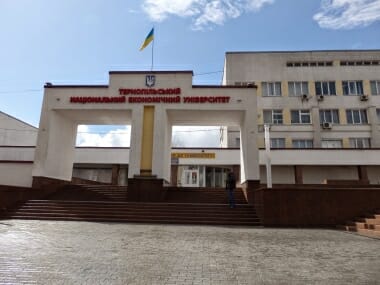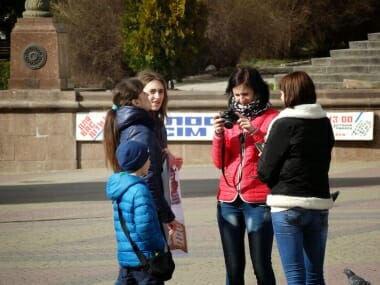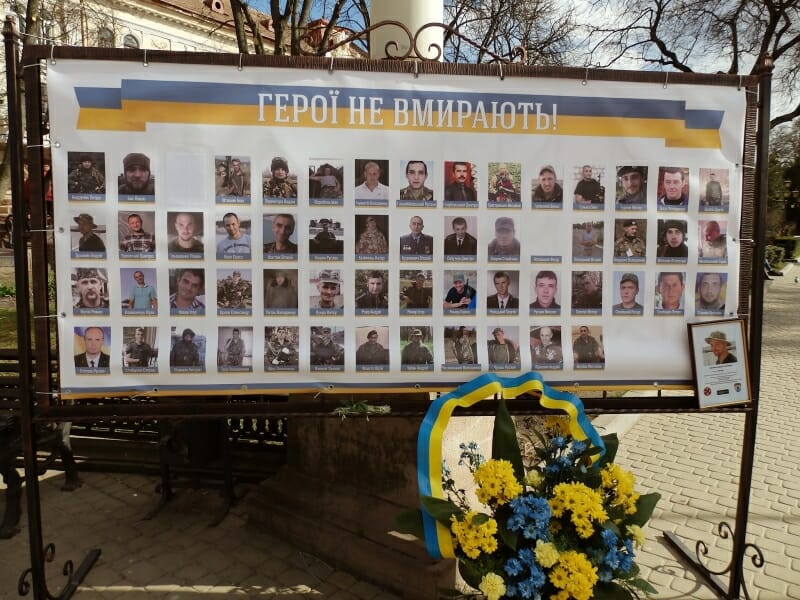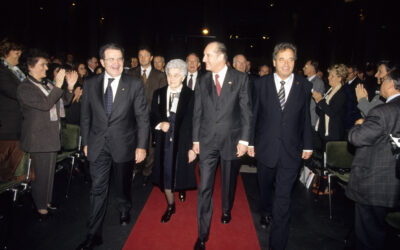 In his heartfelt plea for our many brothers and sisters in the world who “unjustly suffer the consequences of present violence and war,” the Pope also prayed for “the beloved Ukraine” that “it might find peace and hope thanks to the commitment of all interested parties.” Yes, because the war in Ukraine even now continues in its absurdity and violence. We are talking with Roberto Catalano who has been invited to hold conferences on the topic of dialogue, at the Universties of Leopoli, Ivanova Franziksva and Ternopil. It is significant that in the midst of the ‘crisis,’ the young people (and their tutor), rather than becoming entrenched in their private worlds, are out working for deeper dialogue as the only resource that directs their every effort. Roberto, what was the general feeling among the people you met?
In his heartfelt plea for our many brothers and sisters in the world who “unjustly suffer the consequences of present violence and war,” the Pope also prayed for “the beloved Ukraine” that “it might find peace and hope thanks to the commitment of all interested parties.” Yes, because the war in Ukraine even now continues in its absurdity and violence. We are talking with Roberto Catalano who has been invited to hold conferences on the topic of dialogue, at the Universties of Leopoli, Ivanova Franziksva and Ternopil. It is significant that in the midst of the ‘crisis,’ the young people (and their tutor), rather than becoming entrenched in their private worlds, are out working for deeper dialogue as the only resource that directs their every effort. Roberto, what was the general feeling among the people you met?  “At the end of one conference, one of my scholastic colleagues showed me three photos of some ex-students of the University who had been killed in the conflict in the south of the country. With eyes filled with tears, he told me that every evening after lessons, a group of students gathers in the cafeteria of the university to cook Ukrainian dishes, which are then frozen and delivered to soldiers. Annother woman told me about her six year-old son who draws cartoons and sends them to soldiers, as a sign of thanks for defending his country. Unfortunately, unlike last year, the news is no longer reporting on what is taking place in Ukraine. Yet, there is actually a war underway in East Ukraine.” There seems to be no way out of the situation that is generating suffering and suspense in the hearts of the people. . . “I had living proof of this deep suffering during every moment of my stay in Ukraine. Students and professors asked me what I thought about the situation in the country and, above all, what the rest of Europe was saying. I didn’t have the nerve to express judgements. Faced with their fear and suffering I preferred to listen and stay silent. I was impressed by the strength and dignity of that people, but it also frightened me that the rest of Europe and of the world have abandoned them to their fate, aggravated also by the growing nationalism, another phenomenon that could be hiding large dangers for the future.”
“At the end of one conference, one of my scholastic colleagues showed me three photos of some ex-students of the University who had been killed in the conflict in the south of the country. With eyes filled with tears, he told me that every evening after lessons, a group of students gathers in the cafeteria of the university to cook Ukrainian dishes, which are then frozen and delivered to soldiers. Annother woman told me about her six year-old son who draws cartoons and sends them to soldiers, as a sign of thanks for defending his country. Unfortunately, unlike last year, the news is no longer reporting on what is taking place in Ukraine. Yet, there is actually a war underway in East Ukraine.” There seems to be no way out of the situation that is generating suffering and suspense in the hearts of the people. . . “I had living proof of this deep suffering during every moment of my stay in Ukraine. Students and professors asked me what I thought about the situation in the country and, above all, what the rest of Europe was saying. I didn’t have the nerve to express judgements. Faced with their fear and suffering I preferred to listen and stay silent. I was impressed by the strength and dignity of that people, but it also frightened me that the rest of Europe and of the world have abandoned them to their fate, aggravated also by the growing nationalism, another phenomenon that could be hiding large dangers for the future.”  Exactly as the Pope said when he talked about the slaughter of the students in Kenya. In the face of these atrocities, it seems like the international community turns its eyes the other way. And yet, the Ukrainian people are also our brothers and sisters, because of our common humanity and our common Christian faith that inspires them. “I visited a large church where the liturgy was being celebrated according to the Eastern Rite. The beautiful and very modern iconostasis was quite striking, but more surprising was the religiosity of the people who were so attentive and wrapt in prayer. I was struck by the long queue of people waiting for Confession. Seventy years of Marxism didn’t wipe out the faith of the people.” In your opinion, is there any hope there will be peace? “I only visited one half of Ukraine and wasn’t able to hear the other side, but they also have their suffering that is perhaps more difficult to understand. And it’s another story over here with its own twists and turns, but also with its present problems that are dictated by international interests in gas and oil. There is the risk of silence that covers up the suffering of millions of people. As the Pope suggested, there is a need for commitment from all the interersted parties. This is the only way an enduring peace will be able to be reached.
Exactly as the Pope said when he talked about the slaughter of the students in Kenya. In the face of these atrocities, it seems like the international community turns its eyes the other way. And yet, the Ukrainian people are also our brothers and sisters, because of our common humanity and our common Christian faith that inspires them. “I visited a large church where the liturgy was being celebrated according to the Eastern Rite. The beautiful and very modern iconostasis was quite striking, but more surprising was the religiosity of the people who were so attentive and wrapt in prayer. I was struck by the long queue of people waiting for Confession. Seventy years of Marxism didn’t wipe out the faith of the people.” In your opinion, is there any hope there will be peace? “I only visited one half of Ukraine and wasn’t able to hear the other side, but they also have their suffering that is perhaps more difficult to understand. And it’s another story over here with its own twists and turns, but also with its present problems that are dictated by international interests in gas and oil. There is the risk of silence that covers up the suffering of millions of people. As the Pope suggested, there is a need for commitment from all the interersted parties. This is the only way an enduring peace will be able to be reached.
Be recollected
Be recollected




0 Comments